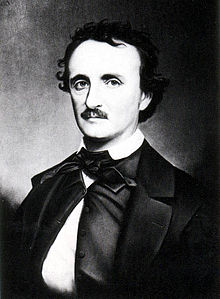Mr.Poe, Where Is America?
In a class on Gothic literature in America it is inevitable that you will read Edgar Poe. Although the class I am currently in only takes a cursory glance at Mr.Poe, it was enough to embroil my imagination. Reading many of Poe's stories led me to ask the question "where is America?" Poe sets his locations in Europe. His most enchanting and prolific protagonist, Dupin, is a Frenchman and the "Pit and the Pendulum" is set in Spain. Yet it was reading Poe's ""The Man of the Crowd" coupled with a wonderful essay by Robert Byer, that made me search for more about Poe and specifically led me to Baudelaire.Baudelaire translated much of Poe's work into French and was an ardent defender of Poe's work. In his essay "Further Notes on Edgar Poe" he touches on many subjects. Most exquisite is his reading of America and why it was, at the time, not a fertile ground for the Imagination. Much of the rhetoric has to do with Baudelaire's own stance against "progress" but much of what Baudelaire says makes sense in the culture created in the industrial revolution and the culture expressed in "The Man of The Crowd". Industrial capitalism coupled with democratic identity simply does not leave room for the realm of the imagination to flourish. This needs to be unpacked and perhaps defended more than I am willing to do in an informal forum such as my own blog. Sufficed to say, what is meant is that Poe sought alien scenery for his tales because America was a hostile ground for his exact tales.
Baudelaire states that in America "it will always be difficult to pursue at once nobly and fruitfully the profession of man of letters without laying oneself open to the slander and calumny of the impotent" and that "what is difficult enough in a benevolent monarchy or a regular republic becomes well-nigh impossible in a kind of nightmare chaos in which everyone is a police-constable of opinion and keeps order one behalf of his own vices--or of his virtues" (101). He then goes on to list the problems with the American state including pious hypocrisy, slave owning scandal, and bohemianism. These issues shied Poe away from engaging his tales on American soil. Nathaniel Hawthorne even confined most of his stories to New England--and in many of them subjects such as the crushing of the Native American, or the brutality of the slave trade--are virtually invisible. So Poe, who wanted to engage in ideas of the mind and radical ideas of modernity, was put upon to use another climate: Europe.
In tales that take place in Europe, Poe could explore the creation of the uncanny. Europe has a dense and long history. Thus Poe could explore the idea of progress, of the old and the new clashing, of replacement, in a climate that had been experiencing it for years.However there could be even more reason, or no reason at all, why Poe would refuse many of his stories the setting that was his birthplace. Yet, noticing at least that Poe had chosen against America, can lead one to ask the question of why.
In my own project over the next few months, I intend to tackle this question and have been led to some insightful materials on the subject. Stay tuned, whoever it is that reads this blog!
Baudelaire, Charles. Trans. Mayne, Jonathan. The Painter of Modern Life and Other Essays by Charles Baudelaire. London, England: Phaidon Publishers Inc. 1964. Print.

No comments:
Post a Comment